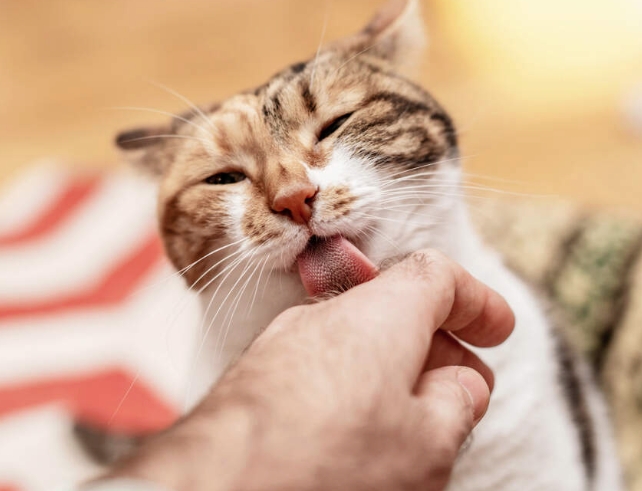Why Does My Cat Lick Me When I Pet Her?
Cats are fascinating creatures, full of quirks and unique behaviors. One such behavior is when your cat licks you while you’re petting her. For many cat owners, this action can be both endearing and perplexing. What does it mean? Is it a sign of affection, or does it serve another purpose? In this article, we’ll explore the reasons behind this behavior and provide tips for petting your feline friend in a way that strengthens your bond.

Why Does My Cat Lick Me?
Cats lick for a variety of reasons, and the context often determines their motivation. Here are the most common explanations:
1. A Sign of Affection
Licking is one way cats show love and trust. When your cat licks you, it’s akin to how she grooms her feline companions. This behavior indicates that she considers you part of her social circle and is expressing her fondness for you.
2. Grooming Instincts
Cats are meticulous groomers, and licking is a significant part of their self-care routine. By licking you, your cat might be attempting to “groom” you as she would a fellow cat. This is her way of including you in her grooming rituals, a behavior rooted in her instincts.
3. Marking You as Her Territory
Cats have scent glands in their tongues. When they lick you, they may be marking you with their scent to claim you as part of their territory. This behavior is a subtle way of communicating ownership and ensuring other animals recognize you as “hers.”
4. Seeking Comfort or Stress Relief
Licking can have a soothing effect on cats. If your cat licks you while you’re petting her, it could mean she finds the interaction calming and is reciprocating the positive feelings. Conversely, if she’s feeling stressed, licking might be a self-soothing behavior.
5. Curiosity About Your Taste
Cats have a keen sense of smell and taste. If your hands have traces of food, lotion, or other interesting scents, your cat might lick you out of curiosity.
6. Overstimulation
In some cases, licking can be a sign that your cat is becoming overstimulated. Cats have sensitive skin, and while they enjoy petting, too much can lead to discomfort. Licking may be a way of signaling that she needs a break.
How to Interpret Your Cat’s Behavior
To determine why your cat is licking you, consider the following factors:
- Body Language: Is your cat relaxed and purring, or does she seem tense? Relaxed behavior usually indicates affection, while tension could suggest stress.
- Context: Does your cat lick you during specific activities, like petting, or only at certain times of the day? Patterns can provide clues about her motivations.
- Frequency: Occasional licking is typically normal, but excessive licking might warrant a closer look at her environment and health.
Tips for Petting Your Cat
Understanding your cat’s preferences can make petting a more enjoyable experience for both of you. Here are some tips:
1. Let Her Initiate Contact
Cats appreciate being in control of interactions. Wait for your cat to approach you before initiating petting. If she rubs against you or head-butts you, that’s her way of signaling she’s ready for affection.
2. Focus on Preferred Areas
Most cats enjoy being petted in certain spots:
- Base of the Ears: Many cats love gentle scratches here.
- Under the Chin: This is another favorite area for many felines.
- Cheeks: Cats have scent glands in their cheeks, and rubbing or petting here can be particularly satisfying for them.
Avoid touching areas like the belly, tail, or paws unless you know your cat is comfortable with it. These areas are often sensitive and can make your cat feel vulnerable.
3. Use Gentle Strokes
Cats prefer slow, gentle strokes over fast or rough petting. Use an open hand and follow the direction of their fur.
4. Watch for Signs of Overstimulation
Cats can quickly go from enjoying petting to feeling overstimulated. Signs of overstimulation include:
- Twitching tail
- Flattened ears
- Dilated pupils
- Gentle biting or licking
If you notice these signals, stop petting and give your cat space.
5. Respect Their Boundaries
Every cat is different. Some may enjoy long petting sessions, while others prefer brief interactions. Pay attention to your cat’s cues and respect her limits.
What If Your Cat’s Licking Becomes Excessive?
While occasional licking is normal, excessive licking can indicate underlying issues, such as:
- Stress or Anxiety: Changes in the household, new pets, or disruptions to routine can cause stress.
- Health Problems: Skin conditions, allergies, or dental issues might lead to excessive licking.
- Boredom: Cats with insufficient mental or physical stimulation may engage in repetitive behaviors like excessive licking.
If your cat’s licking becomes excessive or is accompanied by other unusual behaviors, consult a veterinarian to rule out medical or behavioral concerns.
Building a Stronger Bond with Your Cat
Licking is just one way cats show their affection and trust. By understanding your cat’s behavior and providing consistent care, you can strengthen your bond. Here are some additional tips:
- Spend quality time playing with your cat to keep her mentally and physically stimulated.
- Provide a safe, comfortable environment where she can relax and feel secure.
- Use positive reinforcement, like treats and praise, to encourage desired behaviors.
Conclusion
So, why does your cat lick you when you pet her? It’s likely a combination of affection, grooming instincts, and communication. By paying attention to her body language and respecting her boundaries, you can ensure that petting remains a positive and enjoyable experience for both of you. Whether she’s showing love, seeking comfort, or marking you as her own, your cat’s licking is a unique expression of your special bond.
